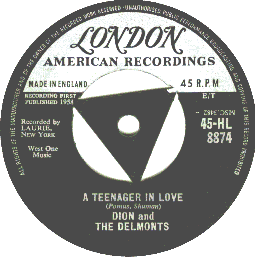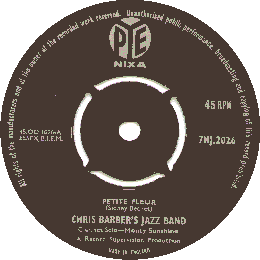
|
1959 | |
| Dion DiMucci born July 18th, 1939 in Bronx, New York | ||
|
This record possibly represents the opposite side of the UK pop industry from the one above. Although it too is an original, not a cover, it was the least successful of the three versions that competed for UK sales during June. Provided they were quick off the mark, UK artists could expect to obtain higher sales with their covers than the American originals. Former Isle-of-Wight milkman, Craig Douglas took this song to #13 and Britain's Marty Wilde reached #2. The Poor Belmonts only managed to scrape to #28. |
||
|
One problem for Dion and the Belmonts was that they were perceived to be a 'Doo Wop' group and that genre never succeeded in the UK. The British became more interested in 'Doo Wop' during the 1970s then they ever were during its American heyday. Dion had more success in the UK as a solo artist when he split from the group in 1960. His powerful renditions of numbers like 'Runaround Sue' and 'The Wanderer' were great chart successes on both sides of the Atlantic. Note that London actually credited this recording to 'Dion and the Delmonts'; a type of error not that uncommon in 1959! They actually got it right on the group's later releases. |
||

|
1959 | |
| Chris Barber born April 17th, 1930 in Welwyn Garden City | ||
|
Chris Barber is already featured on this site by being the bass player on 'Rock Island Line' (see 1956). He is one of few artists to chart in the 1950s and still be regularly performing now. As the 1950s gave way to the 1960s, the UK chart accommodated quite an eclectic mix of musical styles. The Chris Barber Band were responsible for introducing traditional jazz which was to prove a very popular part of the UK chart scene during the early sixties. |
||
|
Petite Fleur, a beautifully crafted instrumental played by Monty Sunshine on clarinet, was to be the band's only top ten single. Nevertheless, it led the way for a long period of trad hits from other artists, notably the bands of Acker Bilk and Kenny Ball. The latter was accused of diverging too far from the path of 'true trad'; an absurdity, for if the likes of Louis Armstrong had not diverged from 'true blues' then jazz would never have been invented. It was a ridiculous charge when one considers that Kenny Ball was still keeping traditional jazz in the UK charts as late as 1967. Nor were the Chris Barber band stuck in a rigid groove. Barber did much to promote other related musical forms by incorporating them into his repertoire. Blues was always well represented through association with traditional artists like Muddy Waters, Louis Jordan and more recently, Dr John. He would also include mainstream as well as traditional jazz in his popular stage act. The band would have two more minor chart entries, the last being 'Revival' in 1962 which reached #43. Despite lack of further success on singles, Chris Barber's Jazz Band remains one of the greatest British musical institutions of the early 21st century. |
||
![]()